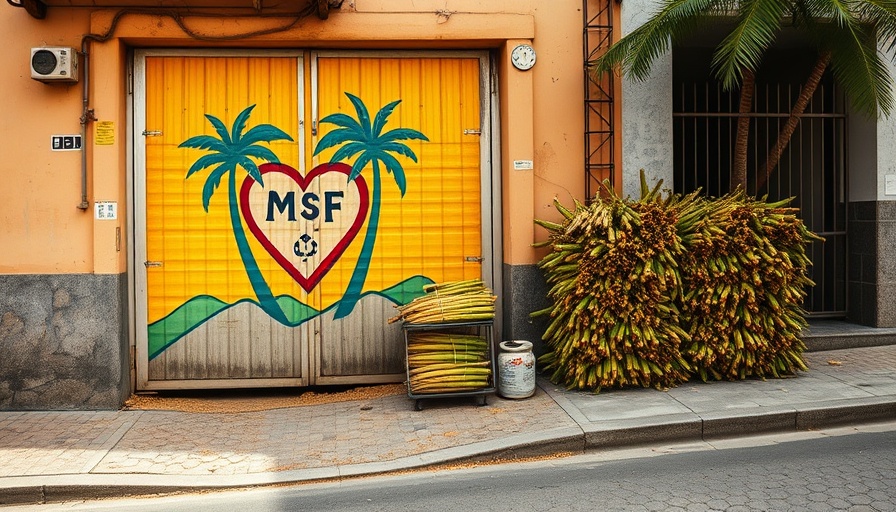
A Humanitarian Crisis: Doctors Without Borders Closes Its Emergency Center in Haiti
In a heartbreaking turn of events, Doctors Without Borders (MSF) announced the permanent closure of its emergency care center in Port-au-Prince, Haiti, due to escalating gang violence in the region. This facility had been a critical lifeline for countless residents in a city now reported to be 90% under control of violent gangs. Over 60% of the health facilities in the capital, including the main general hospital, have also ceased operations, which exacerbates an already dire situation.
The Weight of Violence on Healthcare
These alarming statistics paint a grim picture: from January to June 2025, over 3,100 individuals were recorded as fatalities due to gang-related violence, with 1,100 injuries reported, according to the United Nations. The MSF clinic, located in the Turgeau neighborhood, had previously experienced a temporary closure following an attack on its vehicles in March 2025, underscoring the dire reality health workers face while attempting to provide care amidst chaos.
The Human Cost and Emotional Toll of Closure
The closure of MSF’s center represents not just a loss of medical services but a profound humanitarian cost. Medical professionals have reported an increase in emotional distress and mental health issues among both staff and patients. Family members of patients often witness their loved ones suffer from preventable conditions due to barriers in accessing needed care. For many healthcare workers, this situation has led to feelings of helplessness and depression, highlighted in harrowing accounts shared by doctors in the field.
As reported by frontline healthcare workers, facilities like the Mirebalais University Hospital and others have been pushed to their limits, struggling to provide care amidst ongoing threats. Patients often face monumental challenges just to reach clinics or hospitals, with gang roadblocks frequently hindering access and endangering lives. The risk for medical staff has dramatically increased, resulting in many fleeing the country in search of safety, further destabilizing the healthcare system.
The Broader Picture: A Country in Turmoil
This health crisis is not only a local predicament but symptomatic of a national emergency in Haiti. Chronic political instability, widespread poverty, and recent calamities have created a perfect storm for a country's unraveling social fabric. The situation is compounded by the ongoing gang violence that effectively cuts off entire communities from essential medical services. Reports indicate that many healthcare professionals have been kidnapped or killed in the line of duty, leading to a growing imbalance in health service availability across the nation.
Call for Action: The Need for International Support
The humanitarian community must prioritize assistance to the beleaguered health sector in Haiti. Calls for urgent international intervention stress the importance of providing humanitarian aid, reinforcing healthcare systems, and establishing safe zones for medical providers and patients alike. The wellbeing of the Haitian population depends not only on the cessation of violence but also on a concerted effort to restore and support essential healthcare services.
Personal Stories: Living Through the Crisis
Personal testimonies from a great number of Haitian medical professionals reveal the dedication they have towards improving the nation's health despite the tangible risks. Working in such hostile environments, these individuals often grapple with loss and trauma. Doctors, already stretched thin, recount instances of feeling haunted by decisions that could not save lives. The emotional toll weighs heavily, and many express that they feel a profound sense of responsibility, coupled with an acute sense of helplessness.
Moving Forward: Strengthening Health Systems for Resilience
While the situation in Haiti seems bleak, strengthening health systems is crucial. Local governmental bodies, alongside international health organizations, must collaborate to develop strategies fostering resilience within healthcare communities. The involvement of humanitarian organizations can help provide stability, resources, and support where it is most needed. By investing in the health of a nation, we may not only resolve the immediate crisis but pave the way for a healthier, more secure future.
Conclusion: A Call for Solidarity and Support
As Haiti grapples with the implications of violence and political unrest, it is clear that the world must pay attention. A coordinated response that combines humanitarian aid with a firm commitment to rebuilding infrastructure will be vital to revive a shattered health system. Collective action can foster hope, ensuring future generations have access to vital medical care.
Are you looking to contribute to humanitarian efforts in Haiti? Explore organizations engaged in these endeavors and consider donating. Your support could make a significant difference in the lives of individuals who desperately need care and resources.
 Add Row
Add Row  Add
Add 




Write A Comment